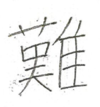Sem2 Week 2 Kanji Flashcards
物

mono / futsu /motsu
object/thing
食べ物
tabemono
food
飲み物
nomimono
rink (noun)
買い物
kaimono
shopping/ purchased items
noun
本物
honmono
(genuine article, the real deal.)
noun.
見物
kenbutsu
sight seeing/watching/viewing
sightsee-er/watcher/spectator
suru verb /noun
末

まつ・すえ
end
週末
しゅうまつ
weekend
年末
ねんまつ
end of year
(noun/adverb)
釣

れん・つ(れる)
連れて行く
つ·れ·て·い·く
godan verb
to take someone (to some place);
to take someone along;
to lead someone away
連れてくる
つ·れ·て·く·る
kuru verb
o bring someone along
国連
こく·れん
United Nations
国(際)連(合)
koku・(sai)・ren・(gou)
United Nations
正しい
ただ正·し·い
i adjective
right; correct
proper; righteous; just; honest; truthful; lawful
正

sei/shou (with othr kanji)
tada (shii)
tada (su)
正す
ただ·す
godan verb, transitive verb
- to correct; to rectify; to reform; to amend; to redress
- to straighten (one’s posture, collar, etc.); to adjust
正月
しょう·がつ
noun
New Year (esp. first three days)
first month of the year; January
正面
しょう·めん
noun, no adjective, prefix
front; frontage; facade; main
広

こう・(with kanji)
ひろ(い)
広い
ひろ·い
i adjective
spacious; vast; wide
広告
こう·こく
(noun, suru verb, no adjective)
advertisement; advertising
(noun, suru verb)
announcement; notice
古

こ (with kanji)
ふる(い)
古い
ふる·い
adjective
old; aged; ancient; antiquated; antique; timeworn
long; since long ago; time-honored
of the distant past; long-ago
stale; threadbare; hackneyed; corny
old-fashioned; outmoded; out-of-date
ふるさ
furusa
oldness
(noun)
古本
ふる·ほん
noun
secondhand book
ancient book; antiquarian books
古(てん)
こ·てん
noun
classic (work, esp. book); the classics
古文
こ·ぶん
noun
ancient writing (i.e. Edo-period or older); classical literature
ancient Chinese character (pre-Qin period)
難

なん (with other kanji)
むずか (しい)
難しい
むずか·し·い
i adjective
difficult; hard; troublesome; complicated; serious (disease, problem, etc.)
impossible; unfeasible
fussy; particular; fastidious; hard to please; displeased
gloomy; glum; sullen; serious (look)
dirty; unclean; filthy; detestable
unpleasant; uncomfortable; creepy; spooky
難しさ
むずか·し·さ
noun
(degree of) difficulty
難(dai)
なん·だい
noun
difficult problem; challenge
説明
せつ·めい
noun, no adjective
explanation; exposition
use with suru
“to explain”
小説
しょう·せつ
noun, no adjective
novel; (short) story
電話

でん·わ
noun, suru verb, no adjective
telephone call; phone call
電気
でん·き
noun
electricity
(electric) light
家電
か·でん
noun
household (electrical) appliances;
home appliances; consumer electronics
電車
でん·しゃ
noun
train; electric train
忘れる

わす·れ·る
ichidan verb, transitive verb
to forget; to leave carelessly; to be forgetful of; to forget about; to forget (an article)
忘れ物
わす·れ·もの
noun
lost article; something forgotten
忘年会
ぼう·ねん·かい
noun
year-end party; “forget-the-year” party; bōnenkai
願う

ねが·う
godan verb, transitive verb
to desire; to wish; to hope
to beg; to request; to implore; to pray
auxiliary verb
to have something done for oneself
お願いします
おねが·い·し·ま·す
(expression)
please
お茶

おちゃ
tea
りょく茶
りょく·ちゃ
noun
green tea; Japanese tea
こう茶
こう・ちゃ
black tea
kis茶ten
きっ·さ·てん
noun
coffee shop; tearoom; coffee lounge; coffeehouse; cafe
茶どう
さ·どう
noun
tea ceremony; Way of Tea
音

おと
noun, noun, used as a suffix
sound; noise; report
音楽
おん·がく
music
音読み
音·よ·み
noun, suru verb
on reading; on’yomi; Chinese-derived reading of a kanji
足音
あし·おと
noun
sound of footsteps
sense or sign that something is approaching
本音
ほん·ね
noun
real intention; motive; true opinion; what one really thinks
親

おや
noun
parent; parents; mother and father
dealer (in cards, mahjong, etc.); banker
founder; inventor
(pet) owner
両(ryou) /親
りょう·しん
noun
parents; both parents
親友
しん·ゆう
noun
close friend; bosom (old, intimate) friend; buddy; crony; chum
親切
しん·せつ
na adjective, noun
kind; gentle; considerate; generous; friendly; nice
親しい
した·し·い
i adjective
close (e.g. friend); familiar; friendly; intimate
familiar (e.g. story); well-known (to one)
close (relatives); closely related
切る

きる
godan verb, transitive verb
to cut; to cut through; to perform (surgery)
to sever (connections, ties)
to turn off (e.g. the light)
to terminate (e.g. a conversation); to hang up (the phone); to disconnect
to punch (a ticket); to tear off (a stub)
to open (some
切れる
きれる
ichidan verb, intransitive verb
to break; to snap; to be cut; to split; to crack
to be injured
to wear out; to be worn out
to break; to burst; to collapse
to wear off; to stop working; to go dead
to expire (time limit, etc.); to run out; to become due
to run out (of stock, etc.); to be exhausted; to be used up; to be sold out; to be out of
to be broken off (e.g. of a relationship); to break up; to have severed ties; to be cut off; to be disconnected
大切
たい·せつ
na adjective, noun
important; necessary; indispensable
beloved; precious; dear; cherished; valuable
careful


